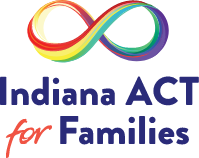“You’re Our Last Hope” Pleas Continue to Gov. Holcomb in Autism Coalition’s Radio Ad Asking to Support a Fair, Sustainable Reimbursement Rate
Today, the Indiana ACT for Families coalition launched a new statewide radio ad in its “You’re Our Last Hope” radio ad campaign urging Governor Holcomb and his administration to reconsider the proposed Medicaid reimbursement rate cuts to Applied Behavior Analysis (ABA) therapy.
The ad features Kim Regnier, a Lafayette mom whose son has autism. Regnier expresses her family’s experiences with ABA and its “life-changing benefits.” She says that “ABA therapy is proven and effective” and tells Governor Holcomb that “thousands of families, like mine, are counting on him.”
The ad’s release comes as days tick by for thousands of Hoosier families and providers who are anxiously awaiting insight from the Governor and his administration regarding a revised rate that ensures the viability of ABA centers across the state. Providers remain concerned that the rate as currently proposed would force many ABA providers to shut their doors entirely and hope that a standardized and equitable rate can be established.
The Indiana ACT for Families coalition has consistently advocated for a sustainable fixed reimbursement rate. Recently, the IndyStar wrote on this topic and highlighted that, “providers, too, agree that there needs to be a standardized rate. But choosing $55, as FSSA is proposing, goes too far, too quickly, they argue.”
However, the new standardized rate recently proposed by the Holcomb administration could, in fact, force many ABA centers in the state to close down entirely. These children, families, therapists, and providers can now only wait and hope that the Governor will listen to their despairing pleas and step in to stop cuts to ABA therapy.
Growing Opposition from Legislature
Recently, over 40 state senators and representatives have weighed in opposing the Holcomb administration’s proposal. In a letter addressed to Governor Holcomb, lawmakers from both sides of the aisle urged the Governor to “intervene in a matter that is of the utmost urgency to thousands of special needs families in our state.” They stated that, “legislators, providers, stakeholders and families are ready to work with your administration to reach a collaborative decision on the shared goal of standardizing these reimbursement rates for ABA.”
Groundswell of Support for a Fair, Sustainable Rate
Lieutenant Governor Suzanne Crouch has also heeded pleas from families, writing to the Family and Social Services Administration’s (FSSA) Secretary Dr. Daniel Rusyniak and speaking to the matter in a recent FOX59 interview. She argues that FSSA needs to “take the time to get this right” and “be sure that we take the time to have discussions and be able to hear from the people that are affected by these services.” Lt. Gov. Crouch also requested that FSSA “delay any further action to finalize proposed rates until a thoughtful consensus can be reached.”
Holcomb Administration Proposal: Separating Fact from Fiction
- Costs: FOX59 recently highlighted FSSA’s position that in 2022 Medicaid ABA therapy expenses were $420 million and “over the last 3 years, ABA expenses increased by more than 50% each year.” There is no denying that Medicaid reimbursement costs – which are largely borne by the Federal government, not the state – have increased over time, but this fails to address the clear and obvious impact of the FSSA’s proposal: Centers will close and reduced access to ABA therapy for Hoosier children, the most vulnerable population, will become a grim reality. In truth, the growth in Medicaid spend can largely be attributed to an increase in the prevalence of autism among the general population, growth in access to diagnosis options, and an increase in the number of children receiving services, – largely because they have greater access to center based care – all of which are positives for Indiana and children with autism (per CDC about 1 in 36 children had been diagnosed with autism by age 8 in 2020 which is up from 1 in 44 children in 2018).
- Closures: It is not accurate and incongruent with providers’ own reports to assert that there will not be closures and other reductions in access to care. Providers have been clear that the significant rate cuts threaten their ability to provide services to families on Medicaid. These fears are not unfounded – providers have shut down in states like Colorado and Oregon due to Medicaid reimbursement rates that weren’t financially sustainable.
- Support for a Fixed Rate and “Standards”: Providers, including coalition members, have stated in clear, unambiguous terms support for a fixed uniform rate fee schedule across all providers, which would address Medicaid spending and budget concerns without threatening families’ access to autism services. Unfortunately, providers’ support for a fixed rate appears to be ignored by officials who favor more extreme cuts. Governor Holcomb, during a recent interview with WTHR spoke about how his administration’s proposal will bring about “standards,” which are “long overdue.” These comments are similar to canned responses being sent to parents by legislators that state the “perception of “cuts” to the reimbursement rates for ABA therapy…” is really only about “working to standardize and establish consistent reimbursement rates for ABA services.” However, the fact is that FSSA’s proposed reimbursement rate for ABA therapy is nearly 50% lower than the current average reimbursement for the most common form of ABA therapy and significantly below provider costs to deliver therapy. There is no way around the truth: This is not standardization; this is a significant cut to autism services.


